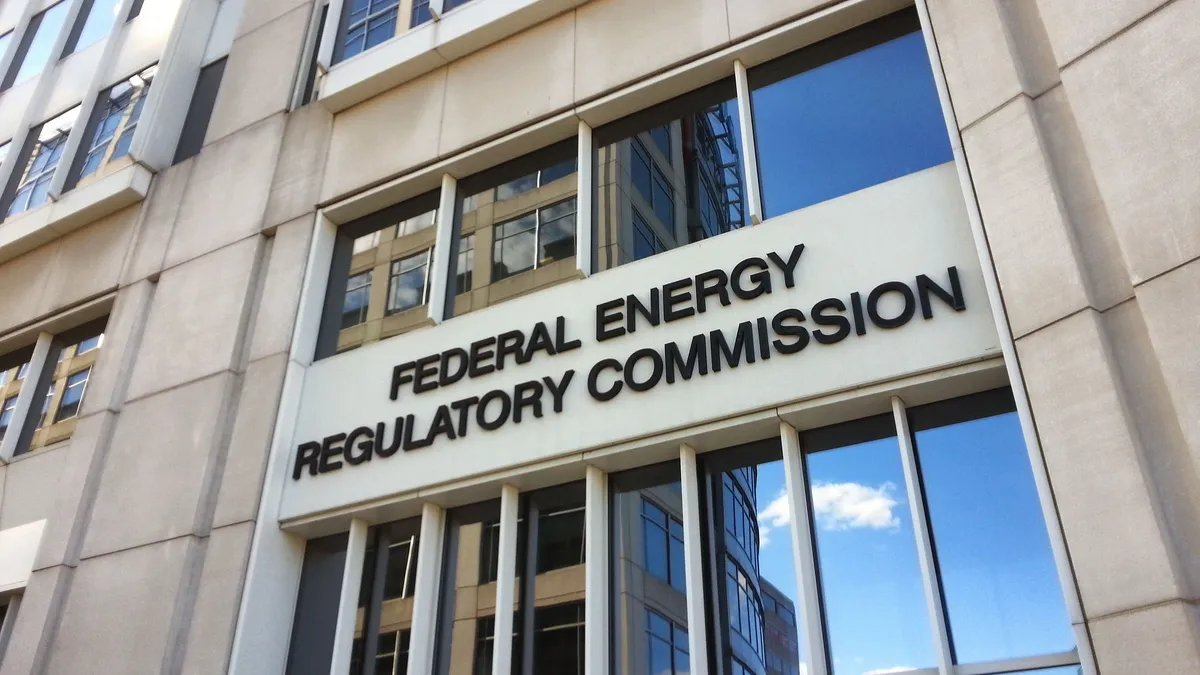Dive Brief:
- The U.S. Senate on Thursday confirmed energy lawyer Kevin McIntyre and Senate committee staffer Richard Glick to the Federal Energy Regulatory Commission by voice vote, filling the agency's five seats for the first time in over two years.
- McIntyre, the co-leader of the energy practice at law firm Jones Day, will serve out the rest of a term that ends in June 2018, and then serve a full term until June 2023. Glick, Democratic counsel on the Senate Energy and Natural Resources Committee, will serve a term that ends in June 2022.
- McIntyre is expected to become chairman of the commission, taking the gavel from Acting Chairman Neil Chatterjee, who was named to the role in August. The new regulators come to the commission just in time to tackle the Department of Energy's controversial cost recovery proposal for coal and nuclear plants; both pledged to keep the commission "fuel neutral" in their confirmation hearings.
Dive Insight:
Though it came months before the DOE announced its controversial cost recovery plan, the confirmation hearing for Glick and McIntyre in September focused largely on questions of baseload power and reliability. DOE had just released its long awaited grid reliability study, and lawmakers from both parties wanted to know how the nominees would interpret the results.
During the hearing, Wyoming Sen. John Barrasso (R) argued the study "expresses concerns that wholesale electricity markets do not adequately compensate coal and nuclear." He asked the McIntyre and Glick if they agreed with a statement from Chatterjee that coal plants should be "properly compensated to recognize the value they provide to the system."
The nominees avoided specific policy statements, saying they would be "inappropriate," as FERC has ongoing business on the issue. But each stressed that they would seek to maintain the independence of the commission, as well as its "fuel neutral" outlook.
“The importance of [baseload] resources cannot be denied,” said McIntyre. “However, FERC is not an entity whose role includes choosing fuels for the generation of electricity. FERC’s role rather is to ensure that the markets for the electricity generated by those facilities proceed in accordance with law.”
Glick went further, saying that changing plant compensation is a “question of reliability.” Turning the grid study's analysis around, he told Barrasso that its findings indicate that enhanced compensation may not be necessary at present.
“The Department of Energy grid study that was released recently ... essentially suggests that the significant loss of baseload generation — both coal and nuclear — has not impaired reliability to date but also suggested it was something to keep an eye on in the future,” he said. “So, I think FERC and the DOE should keep an eye on that.”
In the months since that hearing, DOE has proposed to provide cost recovery for all merchant generation plants that keep 90 days of fuel supply onsite. A broad array of energy interests and former FERC regulators have called for the commission to overhaul or reject the proposal, and the two new regulators will arrive to find a healthy dose of skepticism from their sitting colleagues.
Last month, Commissioners Robert Powelson and Cheryl LaFleur both expressed reservations about the DOE proposal, with Powelson pledging not to vote for a reform that would "blow up the market" and LaFleur doubting that the proposal could form the basis of a final policy as written.
Chatterjee, meanwhile, has tried to situate himself in the middle, saying that he hopes to find a legally defensible route to support baseload generation while preserving wholesale markets.
"Compensating for baseload generation does not equate to destruction of the markets," he told reporters last month. "On the contrary I think it's a step toward accurately pricing the contribution of all market participants."
In addition to the DOE proposal, FERC is working through a backlog of infrastructure proposals that built up when the commission was without a quorum for nearly six months this year. FERC has approved dozens of pipelines since August, but the new commissioners will confront simmering battles over siting jurisdiction with states and a new court directive to include more environmental impacts in their pipeline decisions.
Last month, Chatterjee said he did not expect a recent decision from the D.C. Circuit, which in August rejected a pipeline approval over climate concerns, to change FERC's approach to infrastructure siting.
“I don't believe that [the court’s ruling] was going to significantly alter the way that we evaluate these projects," he told reporters.














